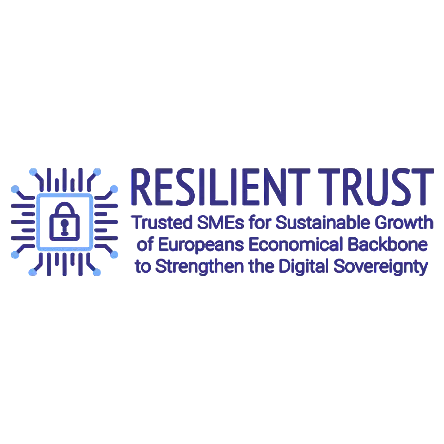
Resilient Trust
HORIZON-KDT-JU-2022-2-RIA | 2023-2026
ABSTRACT
The Resilient Trust project aims to address the challenges and opportunities presented by the Internet of Things (IoT) and its evolution to IoT5.0, which is characterized by AI-assisted devices. IoT holds the potential to enhance daily life, address societal issues, and improve automation on a global scale. However, it also brings significant security concerns, with the widespread connectivity increasing the risk of network exploitation and the presence of unsecure integrated circuits (ICs) due to complex, global supply chains. Furthermore, the use of AI in IoT introduces new attack vectors. Resilient Trust focuses on mitigating these risks to ensure the sustainable development of IoT5.0. Their solution includes end-to-end protection of ICs, tracking their life cycle from the foundry, and addressing vulnerabilities like IC IP piracy and counterfeiting. Threat modeling, risk analysis, and strong security measures will be employed, with a particular focus on IoT domains requiring enhanced security. Resilient Trust’s work will help harness the potential of IoT5.0 while safeguarding against emerging security threats.
OUTCOMES
Resilient Trust will provide secure technologies, incorporating new electronic components, software, and intelligent integration into digital value chains, enhancing Europe’s innovation capabilities. It will develop hardware-based device identity and cloud blockchain solutions to combat IC counterfeiting.
Moreover, Resilient Trust will foster research on attack vectors and prevention mechanisms applicable to Industry 5.0, creating expertise and qualified experts in European cybersecurity. By means of this, faster verification cycles and reduced IC risks will benefit industries, like the automotive sector.
Trusted devices will enhance trust in IoT technologies and foster the use of cyber-aware solutions while ensuring the safety of ICs will improve production line safety and supply chains.
PARTNERS
University Gustave Eiffel (FR), Fraunhofer ENAS (DE), IMST (DE) DGS (IT), Akkodis (IT), Permare (IT), Ro Technology (IT), Rulex Innovation Labs (IT), University of Genoa (IT), Unilink (IT), University of L’Aquila (IT), Almende (NL), Intrinsic ID (NL), TU DELFT (NL), Beammwave (SE), University of Lund (SE), Arteris IP (FR), CEA (FR), University of Grenoble (FR), CNRS (FR), MC2 (FR), Seamless Waves (FR), University of Sorbonne (FR), ST Microelectronics (FR), CSEM (CH), Securosys (CH), 3DB Access (CH).
FUNDING BODY
This project has received funding from the KDT Joint Undertaking, European Commission (grant agreement 101112282).
